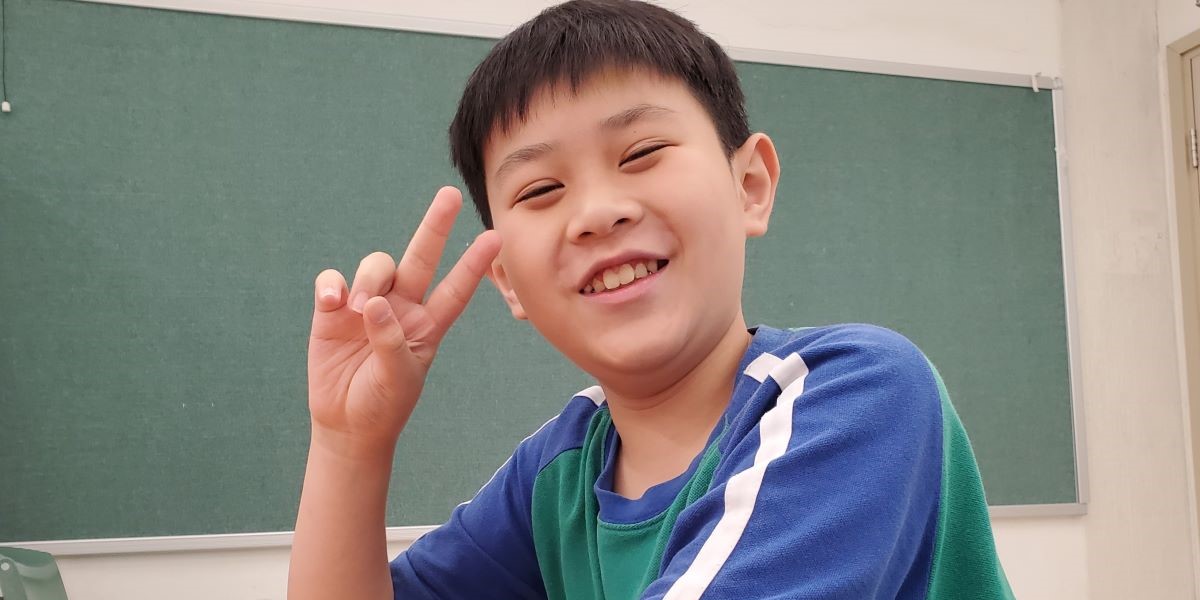
As senior primary students approach secondary school admissions, some of them are anxious about their academic results, crucial for securing placements, which may lead to immense pressure and potential harm to their mental well-being. In order to promote the mental health of students, Save the Children Hong Kong and Side by Side implemented the “Integrating Social and Emotional Learning into School” (ISEL) programme in local schools, in the hope of helping students to understand and manage their emotions, enhance their social-emotional skills, and ultimately benefit their mental wellbeing.
11-year-old A Kiu, who is in Primary 5, has changed from an impatient boy to a caring one after 8 months of learning.
Learning social emotions on regular classes
Like many students, A Kiu is a straightforward person who loves computer games, but he does not know how to control his emotions. When he was upset, he usually got into arguments with his classmates. The St. Patrick’s School he attends introduced ISEL programme last year, which allowed A Kiu and his classmate to learn about social and emotional skills in regular classes.
The programme enables primary students to learn the 5 core competencies: self-awareness, self-management, social awareness, relationship skills and responsible decision-making. Trained instructors regularly organise activities in the classroom that promote students’ mental health and resilience, providing step-by-step guidance and close observation throughout the process.
No Good or Bad Emotions: learn how to recognise and express them!
“ISEL instructor taught us that if we were angry or tired, we could sprawl on the floor to relax.” shared by A Kiu. Taking this lesson to heart, he started using this trick in his daily life, especially when facing strong emotions. Lying on the cool floor became his go-to move, bringing him comfort and calm during tough times.
In programme, the instructors sometimes conduct role-plays so that children can learn that emotions are neutral and how to recognize them. They also introduce concepts like “giraffe language” and the practice of “look, listen, and think” to help students express their emotions and needs during challenging times.
Took first steps to build friendships
A Kiu recalled that in the past, when he and his friends played online games, if they lost, he would be angry and blame his teammates. However, after attending the programme, he can easily manage his emotions even when he loses a game, and has learned to “let go”.
Interpersonal relationships are a crucial part of social-emotional skills. A Kiu has learned this from the programme and decided to take the first step towards improving relationships. He apologised to a classmate he had previously argued with. Now, his relationships with classmates are more harmonious, and they love to seek him out to play together. He has also learned to care for his friends. When a classmate is sad and cries, he used to ignore it, but now he approaches them, brings up fun topics, and tries to cheer them up.
Mum: “I saw his changes. He has grew up into a caring boy.”
A Kiu’s mum has also witnessed his transformation, that he has become more observant and smarter, putting his legs into others’ shoes. “I accidentally broke a rice bowl someday, A Kiu rushed into the kitchen and asked me if I had hurt myself. At that moment, I felt that he had changed.” A Kiu’s mum shared with a smile.
She is also happy that A Kiu is getting along with others, and his academic results have improved. “I don’t expect that,” she said. “This programme will be useful for A Kiu for the rest of his life. In fact, it is important for children to know how to communicate with others and take the initiative to share their needs and feelings. These skills will be important for him when he grows.”
School principal: Everyone needs to learn social-emotional skills
Principal of St. Patrick’s School, Ms. Cheung said, “this programme runs in long-term, so it can remind students to pay attention to their physical and mental health, and it is easy for students to master the skills.”
She believes that mental health is an essential and universal education that everyone needs to learn, whether they are ordinary students or students with special needs. During the programme, students can express their feelings in a safe environment, and teachers remind students how to deal with them. “Spending more time on this topic will naturally have a positive effect on the students,” said Principal Cheung, “Learning about this topic at school reminds students to be tolerant, that improves their mental health and academic performance. This kind of training is also helpful for future development.”
“ISEL programme is suitable for both general students and students with special learning needs, so as to achieve integration and co-learning and to avoid the labeling effect. The programme is organised in weekday classes, which is easier for schools administrative management. In addition, the programme is taught by trained instructors, which avoids adding extra teaching duty for teachers.
Principal Cheung said, “I highly recommend the ISEL programme because my school has participated in it and tried it out, and I believe it is worth recommending, as it allows students to learn about mental health.” She hopes to extend this programme to Primary 1, allowing children to master social-emotional skills from an early age.
